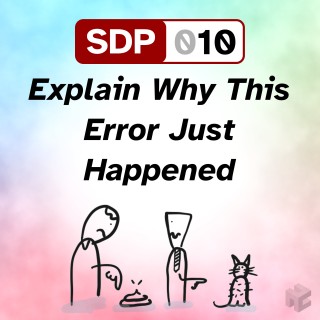Guy: Ten. Explain why this error just happened.
Welcome to Service Design principles. I'm Guy Martin, joined by the author of the ServiceMartin, joined by the author of the Service
Design Principles series of Books founder of the Swiss Innovation Academy and Service designSwiss Innovation Academy and Service design
Practitioner, The Enlightened Daniele CatalanottoCatalanotto
Daniele: Enlightened. I'm already excited to hear all the other ones that you will find withhear all the other ones that you will find with
E! Thanks so much for inviting me, Guy.
Guy: Yeah, no problem. Thank you for being here. Now you're here because you wrote a book calledNow you're here because you wrote a book called
Service Design Principles one to 100. And this podcast is going through those principles one atpodcast is going through those principles one at
a time, one every episode. So today it's principle number ten. Explain why this errorprinciple number ten. Explain why this error
just happened. Now, why is that important Daniele?Daniele?
Daniele: So there is always a story. So let me let me start with the story. I take the train alet me start with the story. I take the train a
lot and for a long time when trains in Switzerland where were late, basically what theySwitzerland where were late, basically what they
were saying was, we're going to arrive 3 minutes late in Lausanne. Sorry about the delay, period.late in Lausanne. Sorry about the delay, period.
And basically what would happen is that you would say, oh, I kind of hate the train company.would say, oh, I kind of hate the train company.
You know, they're late again, You know, even if in Switzerland, obviously Switzerland beingin Switzerland, obviously Switzerland being
Switzerland, we love time. Most of the time it's it's it's well on time. But when it happens, youit's it's well on time. But when it happens, you
know you you would blame the company. And a few years ago they started something new which isyears ago they started something new which is
quite interesting. They started to say, we're arriving. We have 3 minutes late because therearriving. We have 3 minutes late because there
was a person next to the rails
Guy: Okay.
Daniele: and so we had to stop. Sorry for the inconvenience. And then you're like, Oh, I'minconvenience. And then you're like, Oh, I'm
happy that they kind of took that 3 minutes to not kill the guy. And I'm angry against that guynot kill the guy. And I'm angry against that guy
who was stupid to go on the rails, you know? And so it's kind of shifting my emotion not to youso it's kind of shifting my emotion not to you
are the company you should have known better to. Oh, as a company, I understood that you did theOh, as a company, I understood that you did the
the best thing you could do and the best thing you could do at that moment was to be late. Andyou could do at that moment was to be late. And
I respect that, even if it sucks. But even if it sucks, it's not. You are stupid. You didn'tsucks, it's not. You are stupid. You didn't
manage that well.
Guy: I think it's also, like, for me at least, I like to know why things are happening.like to know why things are happening.
Daniele: Yeah.
Guy: So, okay, we're going to be 5 minutes late because of a signal error or because there was abecause of a signal error or because there was a
late train from another direction or, in airline flights. This happens a lot. I remember sittingflights. This happens a lot. I remember sitting
on a tarmac in Frankfurt and we were sitting in the plane for, I don't know, 40 minutes orthe plane for, I don't know, 40 minutes or
something. And this is out on the apron. This is nowhere near a SkyBridge or anything. We'd beennowhere near a SkyBridge or anything. We'd been
bussed out there and they said, we're still waiting for crew from another flight. Thewaiting for crew from another flight. The
flight's late. And we have a minimum requirement that we need before we can, start up the enginethat we need before we can, start up the engine
sort of thing, before we can take off. I don't know the exact regulation, but understandingknow the exact regulation, but understanding
that, okay, the other plane's late, it's going to take time for them to deliver that crewto take time for them to deliver that crew
across. And they actually said as soon as they arrive here, there'll be a bus waiting for themarrive here, there'll be a bus waiting for them
to bring them to this plane. So they're saying, okay, there is a delay. It's terrible. It's veryokay, there is a delay. It's terrible. It's very
late. Here's the reason why. So now suddenly it's like, okay, there is an explanation. It'sit's like, okay, there is an explanation. It's
not just incompetence, And they've got a mitigation to it. as soon as they arrive,mitigation to it. as soon as they arrive,
they're going to make every effort to get that crew across so that we can we can take off andcrew across so that we can we can take off and
we can go. So, just knowing that little bit extra made me dislike them a little bit less onextra made me dislike them a little bit less on
this particular occasion. So overall, their score might still be low, but maybe not as lowscore might still be low, but maybe not as low
as they could be.
Daniele: yeah. And maybe, you know, you just also learn something, you know, as. As you know,also learn something, you know, as. As you know,
you are someone who loves to learn. As we we heard in our one of our episodes about flowers,heard in our one of our episodes about flowers,
you know, it's an opportunity to learn that. Oh, okay. There are regulations about the number ofokay. There are regulations about the number of
staff that needs to be to be here and. Okay, the low is the low. And, uh, I can blame the low. Atlow is the low. And, uh, I can blame the low. At
least I've learned something.
Guy: Now, I'm interested in the aviation industry in general, because I like I likeindustry in general, because I like I like
problem solving and doing root cause analysis and learning from mistakes. And the aviationand learning from mistakes. And the aviation
industry, I think, does it the best out of almost any industry. They learn from theiralmost any industry. They learn from their
mistakes very well. So I wanted to understand a bit more about, okay, well, how does it workbit more about, okay, well, how does it work
with this plane on the tarmac? Because, when the crew comes, there's there's a whole lot ofcrew comes, there's there's a whole lot of
variables that happen here. And this is Frankfurt Airport, one of the busiest in Europe.Frankfurt Airport, one of the busiest in Europe.
And I found out they have this slot allocated to them to be able to take off. So they have tothem to be able to take off. So they have to
apply for a slot to say, okay, we would like to take off and we will be ready to pushback totake off and we will be ready to pushback to
leave our parking area and start to head towards the runway at X time. Right. 3:10 or something.the runway at X time. Right. 3:10 or something.
And then they have this window of time that they have to be rolling on the tarmac to meet thathave to be rolling on the tarmac to meet that
slot. And if they're not rolling, then they lose that slot and it may get given to another planethat slot and it may get given to another plane
because they're too busy. So they can't just afford to wait for 2 hours and hold this windowafford to wait for 2 hours and hold this window
open. So, again, that's another reason that, okay, even when the crew comes, they getokay, even when the crew comes, they get
delivered to the plane. There still might be another delay because they missed their slot,another delay because they missed their slot,
they missed their window. And that was really interesting to me to find that out. And Iinteresting to me to find that out. And I
started, trying to understand, okay, well, how do airport operations work? And, so it was thisdo airport operations work? And, so it was this
frustrating thing. But now I've got time. I've got an Internet connection, so I can look up atgot an Internet connection, so I can look up at
some of this stuff and understand more. So it actually turned into a positive experience foractually turned into a positive experience for
me. So while yes, I was a bit late, I'm going to be a bit late home. It was a learningbe a bit late home. It was a learning
opportunity that I could take advantage of as well. So, trying to find that silver liningwell. So, trying to find that silver lining
maybe there.
Daniele: Yeah. I love it. But I think that's just a perfectly good example where for onejust a perfectly good example where for one
group of people, you know, basically a message like that, which is explain why this error justlike that, which is explain why this error just
happened. Uh, serves three different people. You know, the people who don't give a fuck, whoknow, the people who don't give a fuck, who
basically say, Tell me there is an error. I put my headphones back. It's okay. I would have tomy headphones back. It's okay. I would have to
wait. I don't need to understand why they get the information. The people who want tothe information. The people who want to
understand why they get the information and the people who want to get the information and arepeople who want to get the information and are
curious. Well, then go on Google and say, Why? Why is this happening in that way? You know, andWhy is this happening in that way? You know, and
they will learn something. it's a pretty powerful message because it serves verypowerful message because it serves very
different audiences well, We're not speaking about the why. We'll just serve the ones whoabout the why. We'll just serve the ones who
just are not interested.
Guy: Mm.
Daniele: it reminds me also not just about the errors but also about, you know, often in trainerrors but also about, you know, often in train
companies or stuff, we say we speak about the errors. We don't speak about the littleerrors. We don't speak about the little
victories.
Guy: Yeah.
Daniele: And this is something that I've noticed that more and more companies do is, for example,that more and more companies do is, for example,
companies say, we are leaving on time. You know, and this message, you know, this is powerful,and this message, you know, this is powerful,
you know, because in a day, you know how much people have heard this is not working. Pleasepeople have heard this is not working. Please
take elevator B, this is not working. Please do that. We have delay, blah, blah, blah. But howthat. We have delay, blah, blah, blah. But how
many times could we just say everything is fine? Life is beautiful.Life is beautiful.
Guy: Yeah.
Daniele: Yeah. And and and this is for me, it's a it's been hearing our conversation on that.a it's been hearing our conversation on that.
It's like we're trying to shift the blame. You know, that's a bit of what we're trying to doknow, that's a bit of what we're trying to do
with this. But sometimes we could just also just expose the the goodness of all what's what'sexpose the the goodness of all what's what's
being done right.
Guy: Yeah. It's own our mistakes, but also own our successes.our successes.
Daniele: Yeah
Daniele: . And as cultures, I don't know if if it's like that in your country, but init's like that in your country, but in
Switzerland, you know, we own our mistakes and never speak about what we do. Right. Becausenever speak about what we do. Right. Because
it's a culture of of no ego. We speak about, you know, problems are personal and victories. Theyknow, problems are personal and victories. They
are they are to everyone, you know, everybody did it together. And but at the same time, Idid it together. And but at the same time, I
think it's important in such cultures, especially to be able to reveal that what'sespecially to be able to reveal that what's
happening well.
Guy: Yeah. in Australia, we have this thing called the tall poppy syndrome, where, you know,called the tall poppy syndrome, where, you know,
someone raises a little bit above where they should be and they, they a bit too proud. Thenshould be and they, they a bit too proud. Then
they get cut down very quickly. So culturally, it doesn't often happen that people will sayit doesn't often happen that people will say
that they're fantastic and they're great. But there's a difference there because you can stillthere's a difference there because you can still
be proud of an achievement without being, egotistical or about being over proud or, goingegotistical or about being over proud or, going
over the top. So. So simply saying, okay, and we're leaving on time today. It's great to havewe're leaving on time today. It's great to have
you on board or something like this. It's just that subtle message. But as you say, it's sothat subtle message. But as you say, it's so
it's so powerful. It's to say, okay, whatever else is going wrong today, this little thing iselse is going wrong today, this little thing is
gone. Right. So let's be grateful for that. At least.least.
Daniele: indeed. And and so we can expand a bit this principle by saying whenever you share anthis principle by saying whenever you share an
information, I think is there an additional thing that we could add, You know for example isthing that we could add, You know for example is
it "why" or for example it's we arriving in Lausanne which is a information that you willLausanne which is a information that you will
already give, but could we add something to it which would create something new, which is like,which would create something new, which is like,
oh, we are arriving on time in Lausanne. Oh, okay. Or we are late because of this andokay. Or we are late because of this and
thinking about, okay, we're giving a lot of informations. Is there a little nugget of, ofinformations. Is there a little nugget of, of
supplements, information that we can share that will change the relationship that people havewill change the relationship that people have
with that information?
Guy: Thank you very much. I think that that's a good wrap up to this episode. Well, I'll see yougood wrap up to this episode. Well, I'll see you
next on the next episode,
Daniele: Such a pleasure See you. Bye bye.



